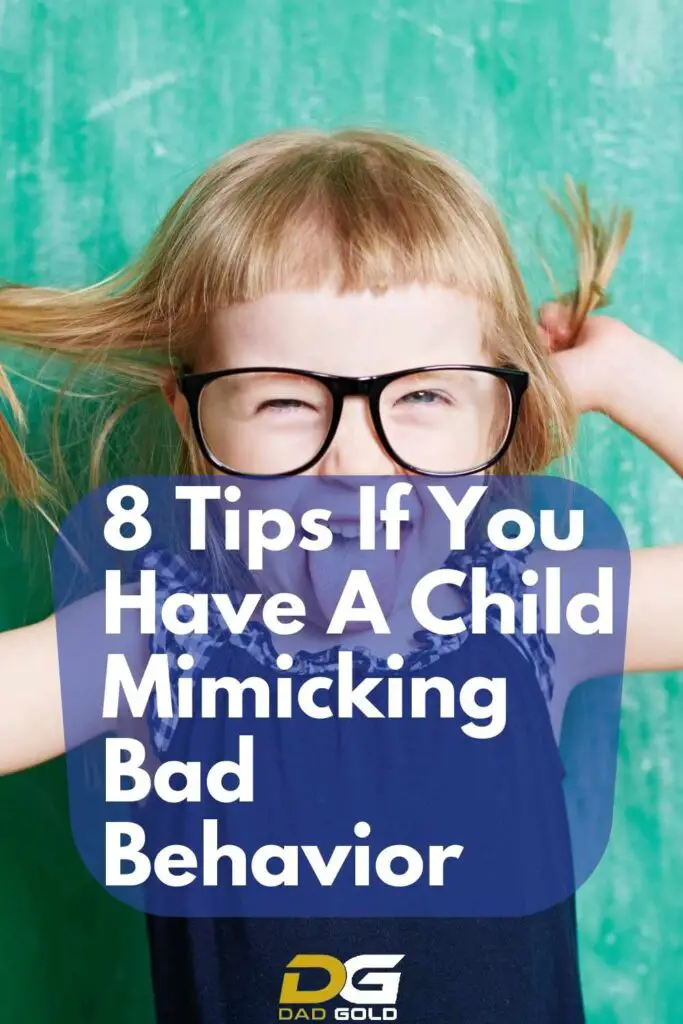Children are at a very formative stage in their lives where almost anything can drastically impact them.
They might see a friend at school do something bad, get laughs from their peers, and then mimic that behavior at home.
Children are impressionable, and anything can rub off on them – including naughty behavior.
It’s essential to nip lousy behavior practices in the bud before they become a routine in your child’s life.
But how?
It can be challenging to address bad behavior, mainly if it stems from mimicking.
Here are a few tips to help you when your child mimics bad behavior.
We’ll start by addressing why your child is mimicking bad behavior.
-

Bold Male Pride – Baseball Trucker Cap Celebrating Masculinity
£18.00 Select options This product has multiple variants. The options may be chosen on the product page -

Dad Bod Appreciation Gift Mug
£14.00 Add to cart -

Dad Bod, Bad Jokes Structured Baseball Cap
£22.00 Select options This product has multiple variants. The options may be chosen on the product page

Why Is Your Child Mimicking Bad Behavior?

Many reasons could lead to a mimicking of bad behavior in young children.
Some are simple. This behavior gets laughs from an audience! Others could be deeper like your child is lacking attention and is seeking ways to receive it.
Let’s look at three of the most common reasons for children to start mimicking bad behavior.
Knowing the cause of this mimicking will help you address the issue and possibly negate the bad behavior faster than otherwise.
When your child begins to mimic bad behavior, ask yourself what is the likely response to this bad behavior.
This will typically point you toward one of the following three reasons for the mimicking.
Laughs
One of the most common reasons for a mimicked behavior is the laughs the action receives.
When your child does something or sees someone else do something bad that gets a laugh, they’ll likely start doing it themselves.
This is particularly common in a school setting when another student does something that gets a laugh from peers.
When your child sees this, they’ll want to recreate the behavior to initiate the same response, unaware that they’re doing bad.
Attention

Your child might want attention – good or bad. They’ll begin to practice bad behavior because they know that people will pay attention to it rather than good behavior.
This could result from lacking attention at home, a deeper issue you’ll need to address while also curving the bad behavior.
Response
Along the same lines of attention, your child might be practicing bad behavior because they know they can get a response.
Some children know that getting a good response is much harder than a bad one. So they’ll mimic the behavior they know is bad for any response.
This could be connected to a lack of attention at home and is likely done for pure reasons. For example, some children can become conditioned that a bad response is the only response they’re likely to get and, therefore, better than no response.
Address the desire for a negative response before they become used to it and seek it out.
Ways to Address the Mimicking

Now we know what might be causing the issues! We can now look at steps to address and solve the problem of bad behavior mimicking.
These tips work best in tandem with one another, so be ready to implement more than one at a time.
Here are 8 tips for parents whose children are continuously mimicking bad behavior.
Defining the Issue
Tell your children that what they’re doing is wrong and is bad behavior.
For some, this might be enough, and your children could stop mimicking the bad behavior they’ve seen. Simply saying what they’re doing is bad will not be enough for others.
State Your Expectations
Let your children know what you expect of them. Once you’ve let them know their behavior is poor, let them know what their behavior should be like.
Give them standards for them to achieve to meet your expectations.
Reward the Good Times

Once you’ve explained what you expect, give them incentives for achieving those standards.
If they have rewards for good behavior, they’ll be much more likely to start practicing the good, and the bad mimicking will drop.
Don’t Be Afraid to Implement Consequences.
This can be tricky as it may lead to more bad behavior. For example, if you’ve found that a lack of attention is not the root cause of their mimicking, consequences for poor behavior are a great way to steer them away from it.
Again, ensure that the consequences aren’t what they’re seeking and address any lack of attention first.
Reward good behaviors; don’t reward bad behaviors. Positive reinforcement is critical!
Learning cause and effect is also a vital development.
Pick the Right Timing
Children have started to embrace an online presence which can be difficult to interrupt.
Sometimes, interrupting a game or scrolling through social media can lead to irritation and will only enforce further bad behavior when you talk to them.
If you’re going to address their mimicking, do so on their schedule so that they feel more comfortable discussing the issues.
Consistency Is Key To The Behavior Of Young Children
Communicate your thoughts clearly and make sure that there are no contradictory expectations.
When your kids are confused, they’ll be much less likely to address the bad behavior they’re mimicking and may even implement it further.
Make it Seem Like Their Choosing.
Giving your kids the feeling of power over their decisions gives them a sense of independence.
When your kids feel they’re making the decision rather than being told to do something, they’re much more likely to follow through with it.
To curb bad behavior, provide them with a choice of two good activities rather than welling in the bad behavior.
Be Their Role Model

The whole issue you’re experiencing is your children are keen to mimic what they see. The problem is that they only see bad behavior, and therefore, that’s what they emulate.
When you offer them good behavior and proper manners, they might start mimicking what you’re doing rather than the bad behavior they see elsewhere.
Leading by example and addressing this issue will be much easier.
Conclusion
Mimicking bad behavior is the prerogative of a young child, especially if it gets them a laugh! Correcting this behavior is not easy. It involves using the tips in this article and engaging with anyone who interacts with your child. Include both parents and all family members.
You have to stop people laughing! When my son swore as a toddler, I laughed. That gave him the motivation to repeat it, again and again and again. That was my influence. You have to control your response.
Controlling yourself is one of the critical things you can do as a parent. You will soon be a parenting expert!
Good luck!





